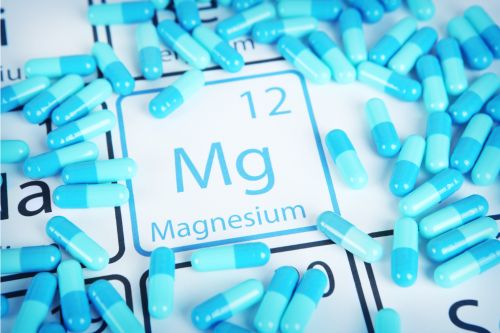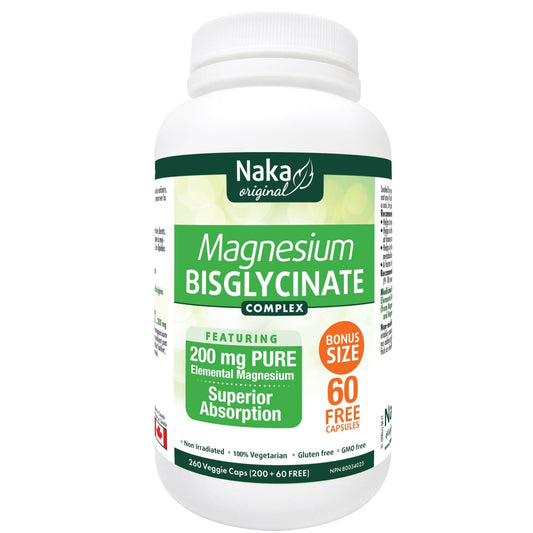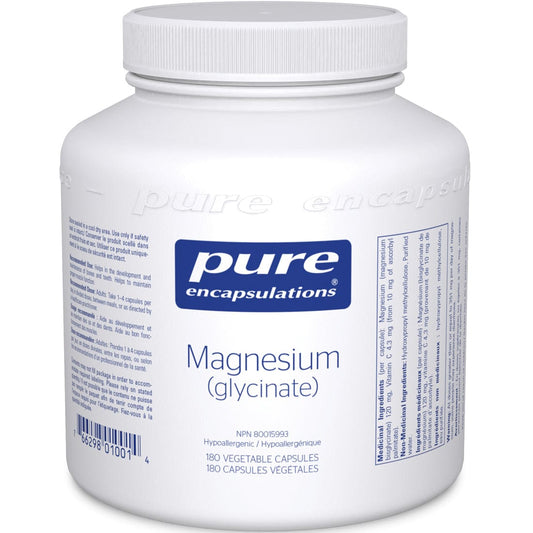4 Min Read
Magnesium Bisglycinate Supplements in Canada: A Comprehensive Guide

Magnesium bisglycinate supplements have garnered widespread attention in Canada for their superior absorption, bioavailability, and potential health benefits. As Canadians seek holistic approaches to wellness, the allure of magnesium bisglycinate supplements continues to grow. In this comprehensive guide, we delve into the intricacies of magnesium bisglycinate supplements, exploring their definition, types, dosages, benefits, drawbacks, efficacy, recommended intake, and signs of deficiency.
Not sure which magnesium supplement is right for you? Try our Magnesium Quiz!
What are Magnesium Bisglycinate Supplements?
Magnesium bisglycinate supplements are oral formulations containing magnesium bound to glycine, an amino acid, facilitating efficient absorption and utilization by the body. This unique chelated form of magnesium offers superior bioavailability compared to other magnesium compounds, minimizing gastrointestinal side effects often associated with magnesium supplementation.
Types of Magnesium Bisglycinate Supplements
Magnesium bisglycinate supplements are available in various forms, including:
Magnesium Bisglycinate Capsules
Capsule formulations provide convenient and precise dosing of magnesium bisglycinate, often encapsulated with other complementary nutrients for enhanced absorption and efficacy.
Magnesium Bisglycinate Powder
Powdered forms of magnesium bisglycinate can be easily mixed into water or other beverages, offering flexibility in dosing and customization according to individual preferences.
Magnesium Bisglycinate Tablets
Tablets provide a convenient and portable option for magnesium supplementation, ideal for individuals on the go or those who prefer a traditional dosage form.
Liquid Magnesium Bisglycinate
Liquid magnesium is a highly absorbable form of magnesium bisglycinate, however it tends to be more expensive than magnesium pills or magnesium powder.
Different Dosages of Magnesium Bisglycinate Supplements in Canada
The recommended dosage of magnesium bisglycinate supplements varies depending on factors such as age, sex, and individual health status. In Canada, typical dosages range from 100-400 mg of elemental magnesium per day, with higher doses recommended for individuals with specific health concerns or deficiencies.
Benefits of Magnesium Bisglycinate Supplements
Supports Muscle Function
Magnesium bisglycinate plays a crucial role in muscle contraction and relaxation, supporting overall muscle function, flexibility, and performance.
Promotes Relaxation and Stress Relief
Magnesium bisglycinate has calming properties that help alleviate stress, anxiety, and promote relaxation, making it an ideal supplement for individuals seeking mental well-being.
Enhances Bone Health
Magnesium bisglycinate is essential for bone mineralization and calcium metabolism, contributing to optimal bone density and reducing the risk of osteoporosis and fractures.
Improves Sleep Quality
Magnesium bisglycinate supports the production of neurotransmitters involved in sleep regulation, promoting restful sleep and alleviating insomnia or sleep disturbances.
Drawbacks of Magnesium Bisglycinate Supplements
Potential Gastrointestinal Side Effects
While magnesium bisglycinate is generally well-tolerated, some individuals may experience mild gastrointestinal discomfort, such as diarrhea or bloating, particularly with high doses or rapid increases in supplementation.
Interaction with Medications
Magnesium bisglycinate supplements may interact with certain medications, including antibiotics, diuretics, and medications for heart conditions or diabetes. It's essential to consult with a healthcare professional before starting magnesium supplementation, especially if taking medications.
How Long Does it Take Magnesium Bisglycinate Supplements to Work?
The time it takes for magnesium bisglycinate supplements to exert noticeable effects varies depending on factors such as dosage, individual absorption, and overall health status. While some individuals may experience immediate improvements in symptoms such as muscle cramps or sleep disturbances, it may take several weeks of consistent supplementation to achieve optimal magnesium levels and observe significant benefits.
How to Tell if You Have a Magnesium Bisglycinate Deficiency
Signs and symptoms of magnesium bisglycinate deficiency may include:
- Muscle cramps or spasms
- Fatigue or weakness
- Insomnia or sleep disturbances
- Anxiety or stress
- Poor bone health or osteoporosis
- Irregular heartbeat or palpitations
If you suspect you have a magnesium bisglycinate deficiency, it's essential to consult with a healthcare professional for evaluation, diagnosis, and appropriate management. Blood tests may be conducted to assess magnesium levels and guide supplementation or other interventions as needed.
How Much Magnesium Bisglycinate to Take
The appropriate dosage of magnesium bisglycinate depends on factors such as age, sex, dietary intake, and individual health status. It's recommended to start with a lower dosage and gradually increase as needed while monitoring for any adverse effects. Consulting with a healthcare professional can help determine the most appropriate dosage based on individual needs and circumstances.
In conclusion, magnesium bisglycinate supplements offer a potent and well-tolerated form of magnesium supplementation, supporting various aspects of health and well-being. By understanding the types, dosages, benefits, drawbacks, and signs of deficiency associated with magnesium bisglycinate supplementation, Canadians can make informed choices to optimize their magnesium intake and promote optimal health throughout the year. As always, it's essential to consult with a healthcare professional for personalized recommendations tailored to individual needs and circumstances.
Not sure which magnesium supplement is right for you? Try our Magnesium Quiz!














